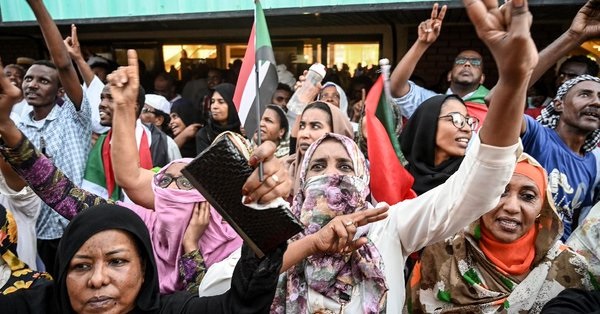
Khartoum, Sudan | AFP | Be it a morning coffee or a late night dinner, Sudanese protesters camping round-the-clock these last three weeks outside the army complex in Khartoum say they have everything covered.
Make-shift clinics, tents and kitchens have sprung up across the sprawling site to cater for thousands of protesters who demand the same thing — that the ruling military council hand power to a civilian administration.
“We distribute tea, food, juices. It’s all from our own expenses,” said Soheir Abdine, 63, one of the protesters who has been encamped outside army headquarters since April 6.
“We sometimes receive donations and help from relatives who are abroad. They send us money that keeps us going,” she added.
Three weeks ago, thousands of protesters braved volleys of tear gas fired by security agents and reached the army complex, where they have since been encamped.
They initially sought the army’s support to overthrow longtime leader Omar al-Bashir, who was duly deposed by the army on April 11.
But the 10-member army council that took power has so far refused international calls and pressure from the street to hand power to a civilian body.
So the protesters are now rallying against the council, demanding it be dissolved.
Demonstrators come from all sections of society — from students, to government employees and labourers.
Some parents have even brought their children.
Abdine has put up a tent near the complex, where about 10 protesters stay at any point in time.
She says she regularly cooks for the protesters using whatever basic ingredients are at hand.
“We eat whatever is available, from beans to pasta with chicken,” she said.
“Whoever wants to stop by are welcomed. They just have to keep going.”
Many other volunteers provide food and shelter to protesters, an AFP correspondent saw while touring the sit-in.
Protest leaders have called on their supporters to hold the ground until they achieve their demands.
On Saturday a joint committee – comprising representatives from the military council and protesters — met to chart the way forward.
But several earlier rounds of talks failed to achieve a breakthrough.
“I will only be convinced that Bashir has fallen when a civilian government is formed,” said Abdine.
– ‘We are staying’ –
Protesters have volunteered for menial jobs at the site, from sweeping, to handing out coffee, tea and water.
These communal endeavours help peers survive the sweltering heat, which reached 41 degrees Celsius (106 Fahrenheit) at one stage on Saturday.
Student Siddiq Mohamed Siddiq said he provides whatever help is needed.
“I am supposed to graduate next year and I know that staying here may delay this,” he said.
“But the nation’s future is more important.”
The protesters dismiss concerns that their prolonged stay could further weigh on an already battered economy.
“We have had 30 years of military rule that destroyed our economy,” said Mohamed Ayman, another constant face at the sit-in since April 6.
Suffering an acute foreign currency shortage, Sudan’s economy has worsened over the years, hit by multiple armed conflicts and secession by oil rich South Sudan in 2011.
Demonstrators believe that the pressure they are exerting on the military council – and the goal of civilian rule – represent the only way to ensure better economic management.
“They (the regime) have been stealing our money in billions over the past 30 years,” Ayman said, voicing confidence that the sit-in has already put a stop to alleged embezzlement.
General Abdel Fattah al-Burhan, the head of the military council, said on Sunday that more than 113 million dollars worth of cash in three currencies has been seized from Bashir’s residence.
The protesters are also demanding that all regime insiders accused of corruption be brought to justice, and that looted funds be recovered.
“The economy is half as affected by our sit-in… as when the regime figures were around,” asserted Ayman.
Even “if it takes us 20 years to bring them down, we are staying” here, he added.
 The Independent Uganda: You get the Truth we Pay the Price
The Independent Uganda: You get the Truth we Pay the Price



